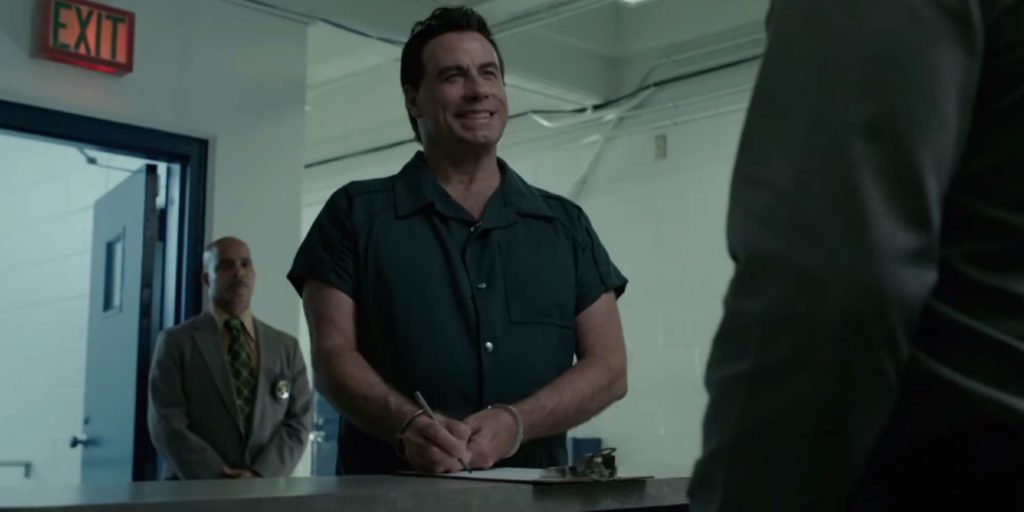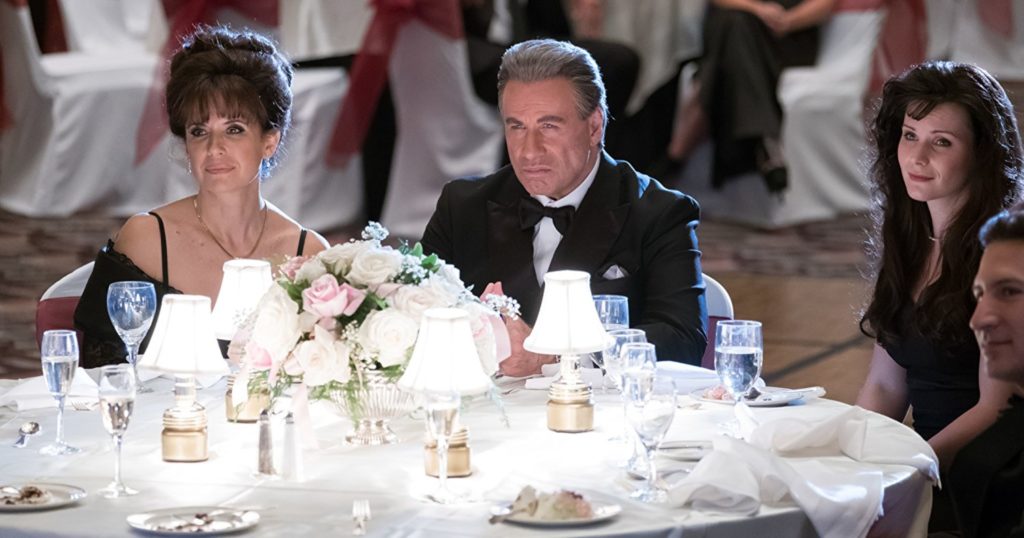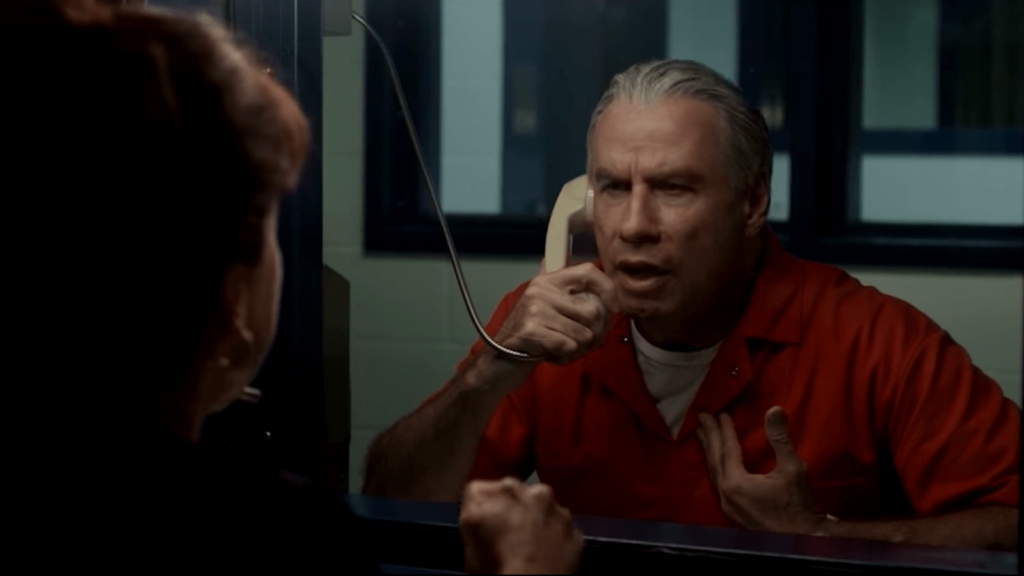John Travolta finally completes his transformation into a Mike Myers character in the memorable-for-all-the-wrong-reasons Gotti.

If you’re anything like me, you will have only heard of Gotti (the film, not the man) due to its quite enjoyably terrible marketing campaign which sprang up in the wake of the dreaded 0% on Rotten Tomatoes and reports that 40% of its disappointing opening gross came from a ticket company with a stake in the film.
The ad begs the question of why critics would “put out the hit” and implies some kind of an ulterior motive. This is funny because, aside from being inherently funny for attempting to goad people into seeing a cheap John Travolta movie, I can’t imagine why anyone would, in fact, watch Gotti unless they had an ulterior motive to wanting to see a good, or even just entertaining, film.
Entertainment is obviously subjective, and Gotti certainly isn’t a complete trainwreck (Travolta isn’t half bad, half the time), but there’s really nothing about this film that makes you invested in it. It’s hard to understand why anyone would want to watch this film unless they were a superfan who was solely thrilled by the idea of a film being made about John Gotti. It never gives you a reason to like Gotti as a person, it never gives you a reason to want to see him either succeed or fail.
Typically, in even the laziest biopics, filmmakers will single out an incident, or recurring theme, from childhood in an attempt to understand, and flesh out, the central character of the film. Gotti starts at the end of his life and proceeds to jump throughout time, seemingly at random. You know exactly where all the characters end up, and their journeys to those points are very uneventful.

The film is mostly just monotonous; a series of scenes of Travolta getting mad about something, interspersed with assassinations. Locations very rarely change either, the vast majority of scenes consist of people having conversations over a table and, for a film that ultimately decides that it’s about the importance of standing up as man, it’s kind of incredible how much of the film is spent sitting down.
The Sopranos perfectly encapsulated the boring reality of being a mob boss but Gotti reveres its bland, and blunt, moments of violence so intensely. It’s much more reminiscent of Johnny Depp’s turn as infamous American gangster Whitey Bulger in Black Mass. A film which also struggled to pick a direction in its sprawling, but hugely uninteresting, saga of a criminal rise to power. Right down to the brief moment where the boss walks down the streets of their turf, giving orders, but stops to enquire about the health of a local old woman; providing the only moment in the entire film which is meant to contextualise the protagonist as some kind of beloved hero to their community.
Maybe this is entirely symptomatic of the film being directed by one of the actual members of the entourage from Entourage but most people who tackle these subjects tend to be smart enough to realise that legends like these, and power shifts like these, often occur through sheer chance and a host of uncontrollable factors. Travolta’s Gotti will often crack a tired dirty old man joke to riotous laughter all around him and it’s delivered with absolutely no hint of self-awareness. The result really is like being stuck at a dinner table with a loud, gigantic, self-aggrandizing bore.

So now is as good a time as any to talk about the film’s director, Kevin Connolly. He played Eric on the famous HBO show and, while I can’t attest to how good or bad he was on that show, unlike most actors-turned-directors he doesn’t seem to put that much of a focus on performance. Travolta certainly has an eye for detail in the mannerisms of his character but there’s nothing about his performance that suggests that it was a) directed by someone other than himself or b) that much of a strain for him.
In fact, there’s not much of a focus on anything. It’s all fairly passable work and, I mean neither of these things as insults, it would probably be more at home on television as a mini-series. At least, that way, certain characters and events could be more defined. Like most bad crime films, there comes a point, somewhere in the middle or around the beginning of the second act, where you realise that you haven’t absorbed the requisite amount of information for the plot to really make sense.
It’s a struggle to remember character’s names or what they do, so it becomes an even bigger struggle to care and there’s such little detail in the production design (there’s one shot where all of the cars parked on a street appear to be the exact same model, just different colours) that you can easily lose track of which decade the scene that you’re watching is meant to be set in.

Gotti, as films about such lucratively larger-than-life characters are, was mired in development hell for several years before coming to Connolly after a slew of veterans, like Barry Levinson and Joe Johnston, and it really shows. The stock footage is clearly a crutch. It’s not just used for exposition, it’s used to cover up things that at least the second unit should have shot, and there’s sections of the score that are clearly meant to be strings but sound like they were played on a Casio keyboard.
As mentioned, it would be passable by TV docudrama standards but, as a film, it doesn’t pass muster and it’s hard to feel sorry for it. It’s not that Gotti is unlikable as a character, it’s that he’s irredeemable. He murders people in cold blood and you’re meant to root for him as a working class hero sticking it to the government. The people who worked to bring Gotti down never even get a mention.
There is still a slight tinge of so-bad-it’s-funny to it. Partially because all of Gotti’s bad luck at the box office was brought on by itself. Producers bought back the rights from original distributors Lionsgate because they didn’t feel it was strong enough to play outside of a limited run in cinemas and it perfectly sums up the hubris and ego of such a project. It’s yet to recoup even half of its production budget but, on the bright side, it probably has made enough to recoup the settlement which the producers had to shell out to actor Joe Pesci after he sued them for breach of contract. Silver linings.


